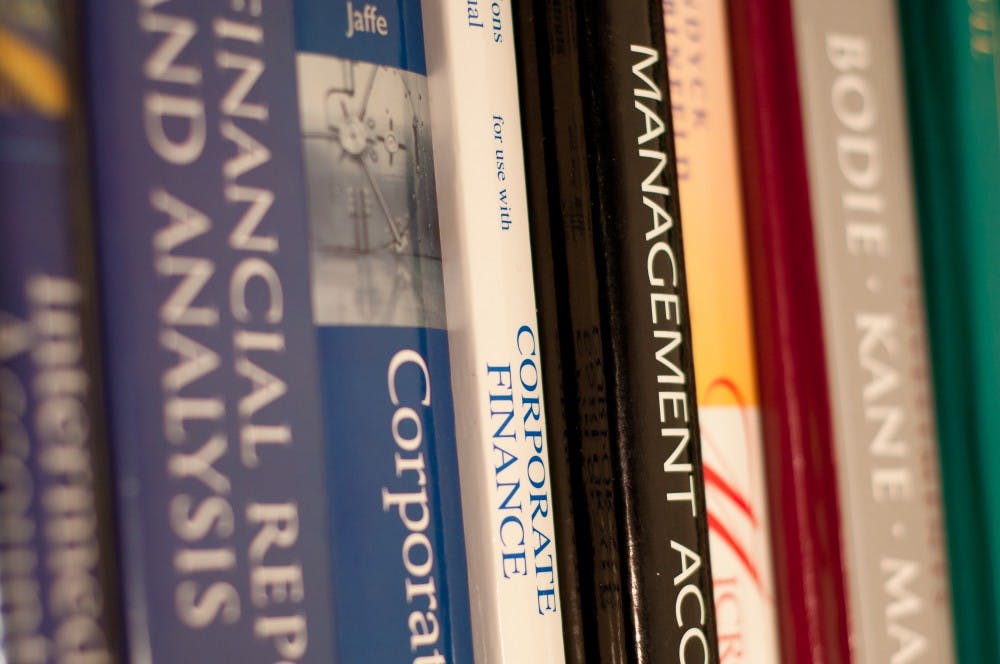
Courtesy of John Liu/Creative Commons
Every semester, Penn students undergo the wallet-depleting ritual of buying expensive required textbooks — but what happens when assigned textbooks are written by the course instructor?
Faculty members say students shouldn’t assume professors make much money when assigning their own materials — Annenberg professor Joseph Turow assigns his own text in the "Mass Media and Society" course, an introductory communications class. He estimates that he makes about $5 per book sold, and other professors report similarly low royalties. In some cases, the cost of permissions for reproduction of articles and images in textbooks is so high that authors do not receive pay for years.
So most professors aren't out to take their students' money. Professors often try to give their students alternate options in obtaining expensive texts — some encourage purchasing used texts, or suggest that students buy their books on online marketplaces like Amazon. Others — such as History professor Kathy Peiss, who assigns her anthology "Major Problems in the History of American Sexuality" in a course she teaches called "History of American Sexuality" — allow students to share copies of required texts with classmates.
Most stop short of offering students full PDF copies of published texts, however, as this option breaks copyright laws and deprives the publisher of all profits. “When PDFs of our books find their way out into the world, that will impact our ability to sell the book successfully and therefore ultimately to sustain our operations,” Director of the nonprofit University of Pennsylvania Press Eric Halpern said.
Professors have also developed innovative ways to make assigning their publications both affordable and fair — Political Science professor John DiIulio, who assigns a text he co-authored in "Introduction to American Politics," donates all royalties from textbook purchases to a Penn scholarship program, and Biophysics professor Philip Nelson provides his students with free copies of textbook drafts that have yet to be published.
Beyond the financial aspect of writing and assigning their own textbooks, professors say they create their own course materials because the alternatives simply aren’t good enough.
“The book contains primary sources, including many from archives or otherwise obscure publications, as well as interpretations by leading historians," Peiss said of her anthology. "I created it because there was nothing else published that covered all of American history in this way."
“I find most of the textbooks … are not as rigorous as I would like them to be. They don’t quite cover the material the way I would like it to be covered," Turow said. "And so I wrote the book.”
However, some professors are rejecting traditional textbooks entirely in their quest for superior course material. Students in professor Robert Ghrist’s Math 104 and 114 sections do not have to buy any textbooks.
Instead, the course operates on a flipped-classroom model. Math 104 students rely on prerecorded lectures from Ghrist’s Coursera class and an online platform known as PennCalcWiki to supplement their out-of-classroom studies.
Ghrist says he created the alternate materials to prepare his students for their field in a way that standard textbooks cannot. “Most textbooks are not optimal for where our students are at right now — they’re big, they’re heavy, they’re expensive, they’re old-fashioned. I make my students learn more than just the basics of what the syllabus covers. I do this very intentionally, because I am training Penn engineers and they need to go out and kick everyone’s butts.”
Although some students said they felt outside texts may be more objective or bias-free, many reacted positively to being assigned texts their instructors had contributed to or written.
“I like when the professor knows a lot about the textbook,“ Engineering freshman Phillip Trent said. “My Econ professor, Rebecca Stein, edited the textbook we used. It was a really good supplement to the lecture, because she knew exactly what was in the book.”
Engineering freshman Enrique Mitchell agreed that there are benefits to using a textbook written by a class's professor. “It does reflect on the legitimacy of the teacher to some point,” he said. “To get a book published, I’m sure, requires a good standing in that field of study.”
Ultimately, Penn professors say they assign their own work out of a desire to supply their students with the best possible texts and classroom experience.
“It’s a small but useful supplement to my income, but that’s not why I do it,” Turow said of the process of writing textbooks. “It’s part of what I do, and how I teach this class.”
The Daily Pennsylvanian is an independent, student-run newspaper. Please consider making a donation to support the coverage that shapes the University. Your generosity ensures a future of strong journalism at Penn.
DonatePlease note All comments are eligible for publication in The Daily Pennsylvanian.








